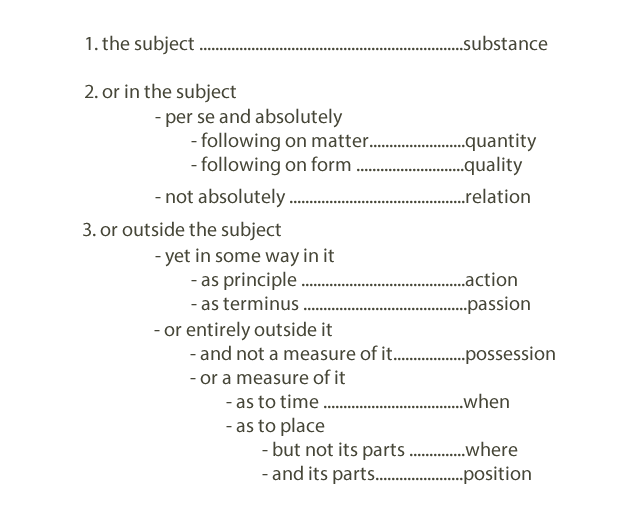Introduction to the Philosophy of St. Thomas Aquinas
Ch 5: The Predicaments
II. ACCIDENTS
a) Meaning of accident. Substance, we have seen, designates being that exists by itself, (in the sense of) not in another. Accident, on the other hand, does not exist by itself; it is, in formal definition, "the mode of being to which it pertains to exist in another as in a subject of inherence":
res cui competit inesse in alio tamquam in subjecto inhaesionis.
This point should be stressed, that accident properly speaking does not exist by itself; it exists only in a subject, though it is also true to say that the subject exists through it. Not that accidents sustain the subject; for the subject that receives accidents is already a constituted being, a being in (first) act. Nevertheless the constituted subject is in potency as regards the perfection which the accidental form is to confer upon it; and in this sense the subject exists (in second act) through the accident. Also, it is perhaps not superfluous to warn that the accident of which we now speak, the predicamental accident, should be scrupulously differentiated from accident considered as one of the five predicables, which refer to modes of predication.
b) Schematic presentation of the accidents. Aristotle, it appears, arrived at his collection of nine accidents by empirical test. They can, however, as we find St. Thomas doing, be derived on a more systematic basis, according as they determine the subject intrinsically, or extrinsically, or partly both.14 The following passage details the procedure, the first paragraph (which pertains to substance) serving as introduction:
A predicate can be referred to a subject in three ways. This occurs in one way when the predicate states what the subject is, as when I say that Socrates is an animal; for Socrates is the thing which is an animal. And this predicate is said to signify first substance, i.e. a particular substance, of which all attributes are predicated.
A predicate is referred to a subject in a second way when the predicate is taken as being in the subject, and this predicate is in the subject either essentially and absolutely and as something flowing from its matter, and then it is quantity; or as something flowing from its form, and then it is quality; or it is not present in the subject absolutely but with reference to something else, and then it is relation.
A predicate is referred to a subject in a third way when the predicate is taken from something extrinsic to the subject, and this occurs in two ways. In one way, that from which the predicate is taken is totally extrinsic to the subject; and if this is not a measure of the subject, it is predicated after the manner of attire [possession], as when it is said that Socrates is shod or clothed. But if it is a measure of the subject, then, since an extrinsic measure is either time or place, the predicament is taken either in reference to time, and so it will be when; or if it is taken in reference to place and the order of parts in place is not considered, it will be where; but if this order is considered, it will be position.
In another way, that from which the predicate is taken, though outside the subject, is nevertheless from a certain point of view in the subject of which it is predicated. And if it is from the viewpoint of the principle, then it is predicated as an action; for the principle of action is in the subject. But if it is from the viewpoint of its terminus, then it will be predicated as a passion; for a passion is terminated in the subject which is being acted upon.15
This passage can be reduced as follows:

Casting a critical eye over this table of accidents, we should find that two of them (possession, position) do not command as much interest or importance as the others, for all that they must be acknowledged to represent really distinct modes of being and predication. Possession (habitus) names an accident so extrinsic to a being that it is itself a substance or an aggregate of them, for example a garment; moreover, it is properly said of only one particular kind of subject, man. As for position (situs), this, to be sure, is not the same as place, for it tells, as place does not, the order of parts relative to each other; but it is clearly a derivative predicament and so, like possession (though this is not derivative), of less significance than place or the other predicaments. Aristotle's mind appears to be in line with what we are saying, for he does not always include possession and position in his naming of accidental being.
Again, in its totality the predicamental system applies to material substance only, a point made earlier. Only this substance is quantified; it alone (one kind of it) can have external possessions; and it alone is subject to the conditions of space and time and to the circumstances of transeunt action. This is to say that the study of most of the predicamental accidents is properly remanded to the philosophy of nature; namely, the treatment of quantity, possession, place, time, position, action, and passion. This leaves substance, quality, and relation. Of substance we have spoken. Of quality and relation we have now to speak; for these, encountered as they are in immaterial as well as in material being, are more definitely the concern of metaphysics.
Footnotes
13 The theologian, to be sure, knows of an exception, the Eucharistic Species (accidents); but this transcends the order of nature. - [Tr.]14 Cf. In III Phys. lect. 5; In V Metaph. lect. 9.
15 In V Metaph. lect. 9, nos. 891-892